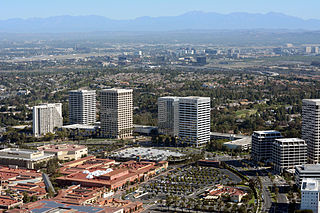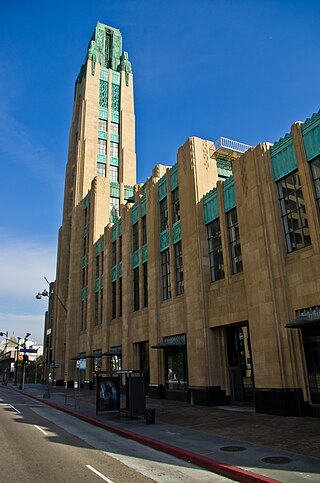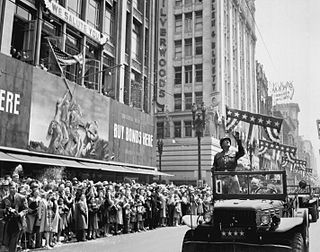Related Research Articles

Fashion Island is an outdoor regional shopping mall in Newport Beach, California. Opened in 1967 by The Irvine Company as the anchor to their master-planned Newport Center district, Fashion Island is anchored by Bloomingdale's, Macy's, Neiman Marcus, and Nordstrom.

Bullocks Wilshire, located at 3050 Wilshire Boulevard in Los Angeles, California, is a 230,000-square-foot (21,000 m2) Art Deco building. The building opened in September 1929 as a luxury department store for owner John G. Bullock. Bullocks Wilshire was also the name of the department store chain of which the Los Angeles store was the flagship; it had seven stores total; Macy's incorporated them into and rebranded them as I. Magnin in 1989, before closing I. Magnin entirely in 1994. The building is currently owned by Southwestern Law School.

Lucky Stores are a pair of American supermarket chains plus a defunct historical chain. The original chain was founded in San Leandro, California and operated from 1935 until 1999. The Lucky brand was revived circa 2007 and is now operated as two distinct chains: Albertsons operates Lucky in Utah and Save Mart Supermarkets operates Lucky California in Northern California.

White Front was a chain of discount department stores in California and the western United States from 1959 through the mid-1970s. The stores were noted for the architecture of their store fronts which was an enormous, sweeping archway with the store name spelled in individual letters fanned across the top. For several years, White Front was the leading discount store in the U.S.

Thrifty PayLess Holdings, Inc. was a pharmacy holding company that owned the Thrifty Drugs and PayLess Drug Stores chains in the western United States. The combined company was formed in April 1994 when Los Angeles–based TCH Corporation, the parent company of Thrifty Corporation and Thrifty Drug Stores, Inc., acquired the Kmart subsidiary PayLess Drug Stores Northwest, Inc. At the time of the merger, TCH Corporation was renamed Thrifty PayLess Holdings, Inc. and Thrifty operated 495 stores, PayLess operated 543 stores.

Bullock's was a chain of full-line department stores from 1907 through 1995, headquartered in Los Angeles, growing to operate across California, Arizona and Nevada. Bullock's also operated as many as seven more upscale Bullocks Wilshire specialty department stores across Southern California. Many former Bullock's locations continue to operate today as Macy's.
I. Magnin & Company was a San Francisco, California-based high fashion and specialty goods luxury department store. Over the course of its existence, it expanded across the West into Southern California and the adjoining states of Arizona, Oregon, and Washington. In the 1970s, under Federated Department Stores ownership, the chain entered the Chicago, and Washington, D.C., metropolitan areas. Mary Ann Magnin founded the company in 1876 and named the chain after her husband Isaac.

Federal Employees' Distributing Company, known as Fedco, was a membership department store chain that operated in Southern California from 1948 to 1999.

May Company California was an American chain of department stores operating in Southern California and Nevada, with headquarters at its flagship Downtown Los Angeles store until 1983 when it moved them to North Hollywood. It was a subsidiary of May Department Stores and merged with May's other Southern California subsidiary, J. W. Robinson's, in 1993 to form Robinsons-May.
Pacific Sales is a wholly owned subsidiary of Best Buy based in Torrance, California. They offer mid-range to luxury appliances, bathroom fixtures and home furnishings as well as an assortment of home electronics and other home improvement products.
Builders Emporium was a chain of home improvement stores based in Irvine, California, United States. At the time of its closing in 1993, it had 82 stores in Southern California and an additional 15 in Nevada, New Mexico, Arizona and Texas; 4,300 employees in total.
Akron Stores or The Akron was a Southern California–based imported goods and home decorating department store retail chain established in 1947 and was known to carry unusual merchandise, mostly imports. The chain had over 24 stores throughout Southern California from San Diego to San Francisco before it was forced to close in 1985.

Desmond's was a Los Angeles–based department store, during its existence second only to Harris & Frank as the oldest Los Angeles retail chain, founded in the 1860s as a hat shop by Daniel Desmond at Los Angeles and Commercial streets. The chain as a whole went out of business in 1981 but Desmond's, Inc. continued as a company that went in to other chains to liquidate them. Desmond's stores in Northridge and West Covina were liquidated only in 1986 and survived in Palm Springs into the first years of the 21st century.

Coulter's was a department store that originated in Downtown Los Angeles and later moved to the Miracle Mile shopping district in that same city.

Mullen & Bluett was a Los Angeles-based department store specializing in men's clothing.
Nahas was a chain of department stores owned by A. S. Nahas, operating in Greater Los Angeles, carrying clothing, household goods and electronics. They also acquired Rathbun's department store at 5311 Lankershim Boulevard in North Hollywood and cobranded it "Nahas Rathbuns" before the branch closed in 1980. The remaining Nahas stores were closed from 1981 to 1982.

7th Street is a street in Los Angeles, California running from S. Norton Ave in Mid-Wilshire through Downtown Los Angeles. It goes all the way to the eastern city limits at Indiana Ave., and the border between Boyle Heights, Los Angeles and East Los Angeles.

Dearden's was a chain of department stores based in Los Angeles that operated for 108 years. It was founded in 1909 by Edgar Dearden, an immigrant from England. Dearden's sold furniture, appliances, cookware, other home goods, jewelry watches, and perfume. It also provided services such as check cashing, travel planning, tax preparation and bill paying. In its last decades, it targeted lower-income Latino clients, especially immigrants from Mexico, Guatemala, Honduras and El Salvador. Dearden's offered its own credit, which it extended to many Latino immigrant customers for whom it was the first credit, and for many of whom it was difficult to get regular credit cards. For some undocumented immigrants in the 1990s, documents from Dearden's established that they were present in the country and helped in the process of receiving amnesty in order to become legal residents of the U.S.

Thriftimart was an American chain of supermarkets in Greater Los Angeles until 1984, founded by Roger M. Laverty. Many stores continue to operate as Smart & Final stores, now owned by Mexico City-based Chedraui.
References
- 1 2 3 4 5 6 7 8 9 10 11 Granelli, James S. (10 June 1997). "Making a Name for Itself". Los Angeles Times. Retrieved 20 September 2021.
- 1 2 Earnest, Leslie (December 11, 1998). "Adray's Abruptly Closes After 30 Years". Los Angeles Times. Retrieved 15 June 2019.
- ↑ Obituary of "Lou" Adray, Orange County Register, January 5, 2018
- ↑ Adray's advertisement, Los Angeles Times, May 10, 1996.
- ↑ Earnest, Leslie. "Inventory Auction Planned at Former Adray's Store", Los Angeles Times, Orange County Business section, page C9.
- ↑ "Adray's closes 5th of 10 stores". Los Angeles Times. March 27, 1996. Retrieved 15 June 2019.
- ↑ Beebe, Barton (30 October 2014). Trademarks, Unfair Competition, and Business Torts. Wolters Kluwer. p. 92. ISBN 978-1-4548-2410-7 . Retrieved 15 June 2019.
- ↑ "Ad for Adray's (Los Angeles)". August 10, 1991. p. 147. Retrieved 15 June 2019.
- ↑ Granelli, James S. "Adray's Wins Long Fight for Name's Sake", Los Angeles Times, June 13, 1997, page D1 and D5.